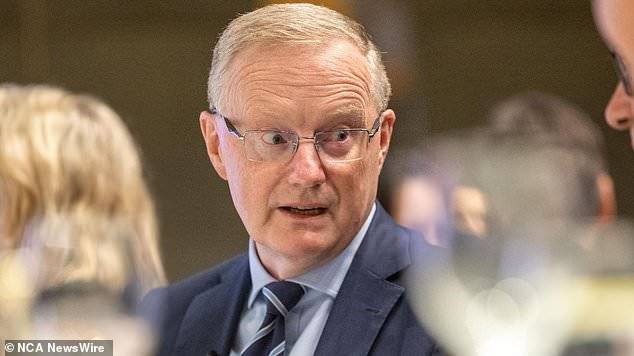One of Australia's big four banks makes major lending change as mortgage cliff looms for up to 900,000 homeowners
Those with a smaller mortgage deposit have fewer options when it comes to negotiating a better loan deal because of a strict financial stress test.
The banking regulator requires lenders to assess a borrower's ability to cope with a three percentage point increase in variable mortgage rates.
But since May 2022, the Reserve Bank of Australia has hiked the cash rate by 3.75 percentage points, a level well beyond the Australian Prudential Regulation Authority's standard stress test.
Those with a smaller mortgage deposit have fewer options when it comes to negotiating a better loan deal because of a strict financial stress test.
The banking regulator requires lenders to assess a borrower's ability to cope with a three percentage point increase in variable mortgage rates.
But since May 2022, the Reserve Bank of Australia has hiked the cash rate by 3.75 percentage points, a level well beyond the Australian Prudential Regulation Authority's standard stress test.
That means borrowers who took out an ultra-low 1.92 per cent, two-year fixed rate in mid-2021 face moving on to a much higher 7.18 per cent 'revert' variable rate - with the RBA cash rate now at an 11-year high of 3.85 per cent - if they can't refinance their 25-year loan, a RateCity analysis showed.
A borrower with an average $600,000 mortgage, in this situation, would see their monthly repayments soar by 65 per cent from $2,518 to $4,163, unless the banks were more flexible.
From next week, Westpac will allow some people looking to refinance their mortgage to be tested under a 'modified Serviceability Assessment Rate' if they do not pass the standard serviceability test.
To be eligible, customers must have a credit score of more than 650 and a good track record of paying down all existing debts during the past 12 months.
Why lending rules hurt
Lenders since November, 2021 have been required to assess a borrower's ability to cope with a three percentage point rise in variable mortgage rates, under Australian Prudential Regulation Authority rules.
With 880,000 ultra-low fixed rate loans due to expire in 2023, that means many borrowers could have a hard time refinancing to a better variable mortgage rate.
The Reserve Bank this month raised the cash rate by another 25 basis points to an 11-year high of 3.85 per cent, marking 3.75 percentage points of increases since May 2022.
That means fixed-rate borrowers would be going from a 1.92 per cent rate to a 7.18 per cent 'revert' variable rate on a 25-year loan.
But if they could refinance, they could instead move on to a more moderate 5.72 per cent variable rate.
For a borrower with an average, $600,000 mortgage, that's a $399 difference between paying $4,163 a month or $3,764 a month.
It also means repayments rising by 49.5 per cent when the fixed loan period expires instead of 65 per cent.
Financial comparison group RateCity backed Westpac's move, and wants APRA to review its existing three percentage point stress test rule which debuted in November 2021.
The current buffer of three percentage points helps ensure new borrowers don't take out excessive debts compared to their incomes,' it said.
'However, the test is locking some existing borrowers into mortgage prison.'
RateCity noted many vulnerable borrowers took out ultra-low fixed rates in 2021, when the RBA cash rate was still at a record-low of 0.1 per cent and APRA only required banks to assess a borrower's ability to cope with a 2.5 percentage point increase in variable mortgage rates when refinancing or taking on a new loan.
'These are often households that borrowed at or near capacity when rates were at record lows and the APRA stress test was at 2.5 per cent,' it said.
'Yet it is these borrowers that are likely to need rate relief more than ever to help stay afloat.
'While different stress tests for new and existing borrowers would be more complicated for the banks to implement, enabling people in mortgage prison to refinance could potentially help prevent some from defaulting on their loan.'
RateCity research director Sally Tindall said Westpac's decision was a 'strategic move' to help bring in new customers and still adhere to responsible lending practices.
She also called on APRA to lower the stress test, saying many Australians who borrowed at capacity when interest rates were at record lows were now struggling with soaring repayments.
'It seems ridiculous to keep these borrowers locked up in mortgage prison when a decent rate cut could be enough to help them stay afloat,' she said.
'These borrowers have already signed up to the debt - the damage is done.
'Giving them a way to minimise the fallout is what they now need, and it's important to have a range of lenders they can choose from.'
The Reserve Bank's 11 rate hikes in a year have marked the most severe pace of monetary policy tightening since the era of the target cash rate began in 1990.
Its data showed 880,000 borrowers will see their fixed rates expire in 2023.
May's 0.25 percentage point rate rise surprised financial markets, because inflation in the March quarter eased to 7 per cent, down from a 32-year high of 7.8 per cent at the end of 2022.
With inflation still more than double the RBA's 2 to 3 per cent target, NAB and ANZ are expecting another increase in July or August that would take the RBA cash rate to 4.1 per cent.
That would see borrowers coming off a very low fixed rate face even more severe increases in their monthly repayments, without a good refinancing deal with their bank.
What a 65 per cent monthly repayments surge looks like
$500,000: $2,099 a month under a 1.92 per cent fixed rate in May 2021 becomes $3,469 a month under a 'revert' variable rate of 7.18 per cent
$600,000: $2,518 a month under a 1.92 per cent fixed rate in May 2021 becomes $4,163 a month under a 'revert' variable rate of 7.18 per cent
$700,000: $2,938 a month under a 1.92 per cent fixed rate in May 2021 becomes a $4,856 a month under a 'revert' variable rate of 7.18 per cent
$800,000: $3,358 a month under a 1.92 per cent fixed rate in May 2021 becomes $5,544 a month under a 'revert' variable rate of 7.16 per cent
$900,000: $3,778 a month under a 1.92 per cent fixed rate in May 2021 becomes $6,237 a month under a 'revert' variable rate of 7.16 per cent
$1,000,000: $4,197 a month under a 1.92 per cent fixed rate in May 2021 becomes $6,930 a month under a 'revert' variable rate of 7.16 per cent
Methodology: RateCity calculations showed that in May 2021, the Big Four banks offered average, two-year fixed rates of 1.92 per cent. The 7.18 per cent 'revert' rate is default variable rate based on Reserve Bank of Australia cash rate of 3.85 per cent as of May 2023. Relates to a 25-year loan. Loans above $750,000 would have revert rate of 7.16 per cent because NAB has a lower rate for bigger loans.




No comments yet
Be the first to share your thoughts!